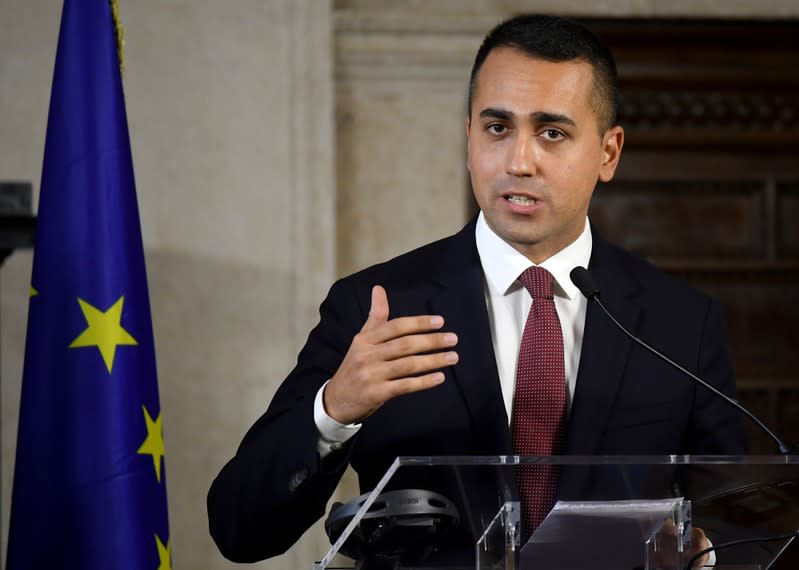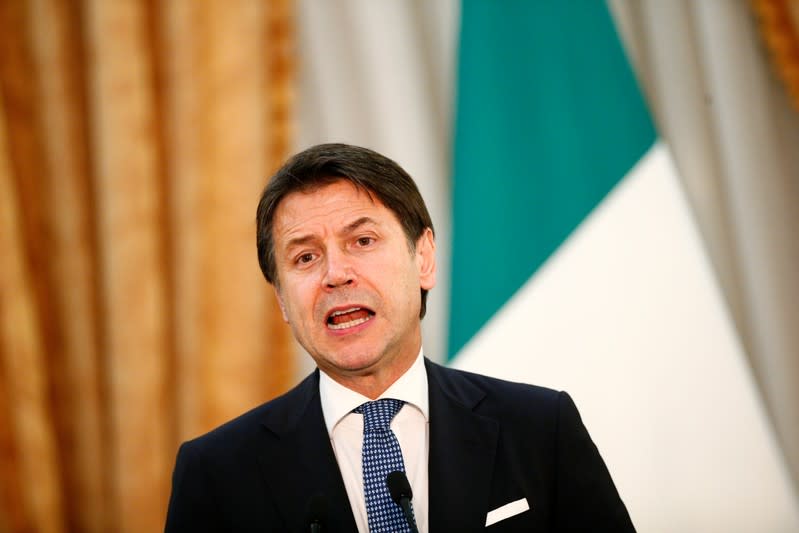5-Star's crisis threatens Italian government's survival
By Gavin Jones
ROME (Reuters) - The 5-Star Movement, senior partner in two coalitions since last year's national election, is struggling with internal strife and falling support which threaten the survival of Italy's two-month old government.
The anti-establishment party won 34% in the March 2018 election, twice that of its nearest rival, but is now polling at half that level. Surveys show a downward trend that is fuelling party anxiety and dissent towards its leader, Luigi Di Maio.
Investors are becoming jittery. The spread between Italian benchmark government bonds and German Bunds, which had narrowed sharply after the government was formed, increased last week to its widest for three months.
Fourteen 5-Star lawmakers defied Di Maio last month by voting down a government plan to save a heavily polluting steel plant in southern Italy by granting legal immunity to its owners while they carried out a clean-up plan.
Di Maio, who is Italy's foreign minister, said last week that his internal critics who speak anonymously to the press were driven by personal ambition and should leave the party.
The lack of discipline in 5-Star's ranks and a trickle of lawmaker defections are a danger to the government, which has only a thin majority in the upper house Senate.
5-Star's problems are also hurting relations with its coalition partners - the centre-left Democratic Party (PD) and small centrist and leftist groups - as Di Maio, 33, tries to dictate policy to regain support. The ensuing tensions undermine coalition cohesion and reduce support for all its parties.
"My baseline scenario is that the government will fall in the spring and there will be new elections," said Francesco Galietti, head of political risk consultancy Policy Sonar.
"The coalition's only clear aim seems to be to keep the (main opposition) League out of power but that may not be enough to hold it together."
"DECLINING PATH"
5-Star steadily shed support in coalition with Matteo Salvini's hard-right League and briefly recovered when Salvini brought down the government in August. The slide has now resumed in its partnership with the PD.
5-Star was founded 10 years ago by comedian Beppe Grillo as a grassroots protest movement against the corruption and cronyism of Italy's political and business elite. It seems that for many voters it has lost its purpose since it became a part of that elite.
"My concern is that they are now on a very severe declining path," said Lorenzo Pregliasco, head of polling and political analysis firm YouTrend.
"With the League they at least had in common that they were both seen as challengers of the old political system, but the PD is a symbol of the establishment 5-Star has always fought. I think this will be very damaging for them."
5-Star calls itself post-ideological. It attracts left and right-wing voters alike, setting it apart from other European anti-system parties such as the leftist Podemos in Spain or the far-right National Front in France.
This was an advantage in opposition, but to gain power it had to ally itself first with the right and then with the left, alienating much of its voter base on both occasions.
It has pushed through flagship measures such as a "citizens' income" poverty relief scheme, curbs on temporary contracts and a cut in the number of parliamentarians, but most Italians remain unimpressed.
Italy's chronically sluggish economy has stagnated and voters have proved far more receptive to the League's relentless focus on immigration and promises of tax cuts.
DI MAIO PROBLEM?
Di Maio has been overshadowed by the more charismatic Salvini, whose League is now polling at about 33%.
Technocrat Prime Minister Giuseppe Conte was always seen as close to 5-Star, though he is not a party member. His approval ratings have grown as Di Maio's have fallen, but his link with the party has weakened and he is now more popular with PD voters.
"We have become too similar to the other parties, we need to be bolder," 5-Star's Education Minister Lorenzo Fioramonti told Reuters, suggesting the party revive its once-strong environmentalist platform that has faded since it took office.
However, some party insiders say the main problem is not policy but Di Maio himself, and a lack of structure for which he is largely responsible.
Di Maio decides policy with a small group of advisers, said a party official who asked not be named. Di Maio did not respond to a request to comment for this article.
He has promised to share more power and has begun a party overhaul to create 12 policy departments made up of local and national representatives. But critics say it is too little, too late.
"I don't think a fresh start for 5-Star is possible under Di Maio," said YouTrend's Pregliasco.
(additional reporting by Giuseppe Fonte; Editing by Gareth Jones)

 Yahoo News
Yahoo News 

